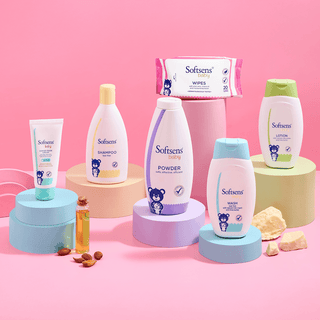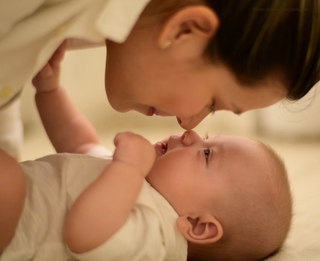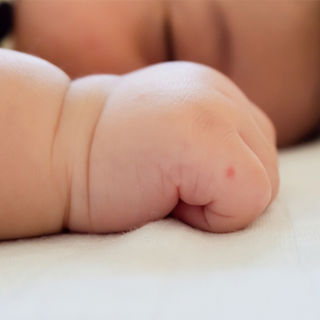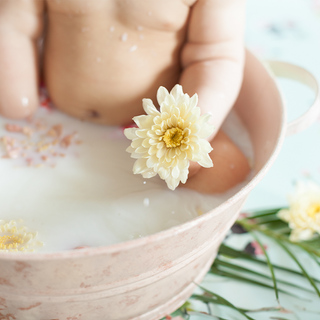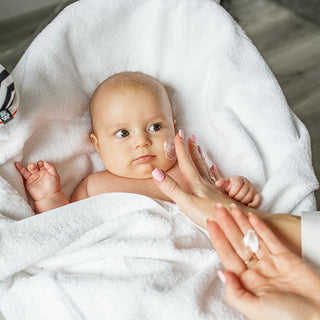
Just like you experienced a range of physical changes during your pregnancy, postpartum too comes with its share of (interesting) bodily changes. One of these is ‘Postpartum Hair Loss’.
Postpartum hair loss is a sudden shedding of hair that takes place around 3-6 months after the birth of your child. While many women notice clumps of hair falling out, some might only experience moderate hair loss. Now, this might sound a little scary, but don’t hit the panic button yet, ladies! Postpartum hair loss is completely normal and affects around 50% of new moms. And if that doesn’t make you feel better, here’s something that definitely will – Postpartum hair loss only occurs for approximately six months or up to a year after you give birth, after which your hair will stop shedding in such large amounts and you will notice hair regrowth.
Before we discuss how to deal with postpartum hair loss, it’s important to understand why it occurs. We’re not playing blame games, but if you’re looking for a culprit, it’s the HORMONES. Did you notice that your hair looked thicker, fuller and shinier during your pregnancy? Well, that’s because of the surge in the hormone estrogen during your pregnancy, which actually promotes hair growth and inhibits shedding. After the birth of your child, your estrogen drop, thus prompting your hair to go into the resting or shedding phase of your hair cycle, eventually leading to excessive hair fall. Like we said before, this is totally normal and you have to let it take its own course.
However, in the meantime, here are some handy tips to help you deal with postpartum hair loss.
1. Go easy on your already-delicate hair
Your hair is pretty delicate at this time so it’s important to treat it gently. Try not to pull your hair back into tight ponytails or top knots. This only causes extra stress to hair that is already weak. Pick a simple, fuss-free hairstyle that’s gentle on your locks. Our tip: use a soft& stretchy fabric headband to keep your hair away from your face without putting any pressure on your strands.

Be gentle on your hair with a trendy headband!
2. Use the opportunity to try a hairstyle you wouldn’t have ordinarily chosen
When you’re tending to a new baby, your hair often takes a backseat, which is why a lot of moms opt for low-maintenance hairstyles. This can also be helpful if you’re dealing with a lot of hair loss. A short bob with layers can add volume to your thinning hair and you won’t have to worry about pulling back your hair into a ponytail or bun. We promise you’ll feel lighter, both literally and figuratively. Another easy way to give your hair a little more volume is by changing your regular hair parting. It can help cover thinner patches of hair and give you a bit of a lift.

Short hair, don’t care!
3. Stay away from heating tools and harsh products
What your hair needs during this time is gentle care & protection, NOT fancy products and styling treatments that involve heat, chemicals and colour, which can potentially cause more hair damage leading to more hair loss. Use blow-dryers and straightening/curling irons as minimally as possible.
4. Eat foods that promote healthier hair
Although you cannot prevent post-pregnancy hair loss from taking place, you can help your hair look and feel better by eating right. Increase your protein intake and make sure you eat a balanced diet by including healthy grains, vegetables and fruits in your meals. Eat these healthy foods that promote healthy hair growth – eggs, spinach, almonds, walnuts, avocados, salmon, yoghurt, oatmeal, berries, chickpeas, chia seeds, and tomatoes.
5. Take necessary vitamins and supplements
Make sure that you continue taking your prenatal vitamins. Some pregnant women experience iron deficiency after giving birth. Ask your doctor if you require any iron supplements or increase your intake of foods that are rich in iron. Omega-3 supplements are also great for inhibiting hair loss.
6. Massage and exfoliate your scalp as often as you can
You probably feel like you don’t have the time or energy to give yourself a scalp massage but this can really help, ladies. Not only does massaging your scalp help increase circulation and promote hair growth, but it can also help release stress and leave you feeling relaxed and calm. Coconut oil, almond oil and olive oil all have great hair nourishing properties and can help combat hair loss. And if you’ve run out of any of those, simply borrow your little one’s Baby Oil and use it to massage your scalp.
In addition to massaging, you should also try to exfoliate your scalp once every two weeks or so. This helps remove build-up of dead skin cells, thus paving the way for healthy hair growth. A simple homemade scrub made of brown sugar and coconut oil should do the trick.
7. Try natural home remedies for hair loss
You can’t stop the hair loss but you can improve your hair’s overall appearance by pampering your hair with safe & gentle natural ingredients. Here are a few of our favourite natural hair loss treatments: banana + egg white hair mask, a paste made from neem leaves and soaked fenugreek seeds, banana + yoghurt hair mask, coconut oil + amla (gooseberry) hair mask, or aloe vera gel.
8. Stressless, exercise more
Stress plays a big role in worsening hair loss. As a new mom, it’s absolutely natural to be a little more stressed than usual. Try and relax by getting sleep whenever possible, practicing breathing exercises or calming meditation. Don’t forget to try and incorporate exercise into your new routine. Even a short walk every day or yoga can improve blood circulation and in turn, promote healthy hair growth.
Most importantly, don’t forget that this is temporary and your hair will grow back. How did you handle your postpartum hair loss? We’d love to know!



